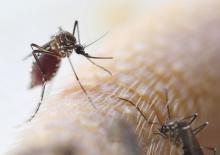DENVER – Prevention of Zika virus infection in pregnancy is critical, given the lack of an effective treatment or vaccine, but it’s easier said than done.
“The particular mosquito that transmits Zika is really difficult because it tends to be indoors and live under the coffee table in your living room rather than outside. It bites in the day, as well as night, so it’s hard to prevent. Trying to consistently have repellent on [and] wear long-sleeved shirts and long pants, even when you’re indoors, in places that are typically quite warm – it’s challenging,” Margaret Honein, PhD, said at the annual meeting of the Teratology Society.
It’s also important to try to eliminate breeding sites. “The Aedes aegypti mosquito can breed in a bottle cap full of liquid. It doesn’t take a large reservoir of standing water,” added Dr. Honein, chief of the birth defects branch at the Centers for Disease Control and Prevention in Atlanta.The CDC’s top Zika prevention advice is that pregnant women should not travel to any area where Zika is a risk. If they absolutely have to go, they should talk to their health care provider first, strictly follow measures to prevent mosquito bites during the trip, take steps to prevent sexual transmission – namely, use a condom – and talk with their health care provider once again upon their return.
It is now clear that Zika can be transmitted sexually. For this reason, even a pregnant woman who doesn’t visit an area with Zika risk, but whose partner has been to such a place, must also practice safe sex using a condom, even if the partner is asymptomatic.
In response to an audience question from a Washington, D.C.–area ob.gyn. who noted that there isn’t a Zika problem in his region, Dr. Honein said that her personal view is that pregnant women living in the vicinity of the nation’s capitol should also follow the CDC recommendations for travelers to, or residents of, areas where Zika is found.
“You have mosquito vectors that can transmit Zika in Washington, D.C., and a lot of other parts of the country,” she said. “There are travelers coming back from areas with risk for Zika all the time. If they get bit by a mosquito, which then bites another person and transmits the infection, there’s a problem. So, for pregnant women in areas that have a mosquito vector that can transmit the virus, I think it’s very wise advice to consistently use mosquito repellent and take the other protective measures. People should be doing everything they can to protect against Zika infection in pregnancy.”


